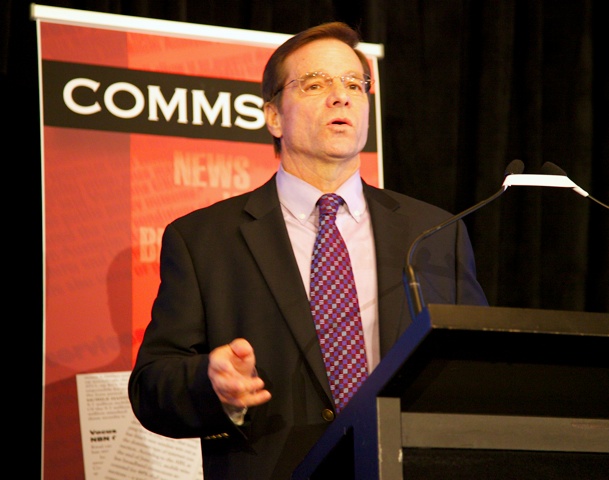Primus CEO sees threat, promise in Telstra

Second-tier ISPs deserve discounts on wholesale NBN services as compensation for their past infrastructure investments, incoming Primus CEO Tom Mazerski has suggested as he offered an optimistic assessment of Telstra's separation commitment, while slamming preferential government dealings with Telstra and Optus.

Tom Mazerski (Credit: David Braue/ZDNet Australia)
While he had expected legal obstructionism when approaching Telstra, Mazerski — who in August was chosen to replace long-time CEO Ravi Bhatia — told the CommsDay Summit in Melbourne that he had been pleasantly surprised by the company's progress in moving towards structural separation.
"I went to Telstra and said, 'I'm changing the way I do business, and we'll have no more hours taken to get things done'," Mazerski explained. "I really thought the answer was going to be a letter to my lawyer saying, 'please refer to page 812 of your contract' but I didn't get that. It was a really pleasant surprise to me, and in that piece of structural separation I believe Telstra is well along the way."
While there were still legal issues as Telstra and the ACCC pore over the detail of the company's structural separation undertaking (SSU) document, Mazerski said that it appeared to him that Telstra's cultural shift towards separation is already well underway.
"If you look at people, and their behaviour, and how they deal with their wholesale customers, it's a reflection of the leaders at the top," he said. "Telstra is really way ahead when it comes to structural separation, in challenging their wholesale people to separate themselves from the retail business. You have to give credit where credit is due."
He wasn't, however, giving Telstra much credit for the ongoing controversy around its South Brisbane fibre to the home (FttH) network, which he derided for being conducted with virtually no industry consultation, even though the move had broad and deep implications.
One of those implications was to raise access prices, leading to frustration amongst resellers like TPG and iiNet that have customers in the area and have no choice but to migrate to the fibre plans or lose their customers.
As well as potentially entrenching a monopoly or duopoly in local-loop access, such policies are likely to deter private investment from operators that will have to weigh up their capital decisions carefully, Mazerski warned.
"If my company decides, for example, that it's just not worth our while or effort, we can take our capital and invest it somewhere else to give a better return to our shareholders," he said.
"You have to recognise and have a recognition of these events. You can do all these things, but if you still have one or two providers with a majority share, you have failed miserably in bringing competition to the market."
Contradicting the arguments of industry players like Internode managing director Simon Hackett, who has frequently expressed his displeasure with NBN Co's 121 points of interconnec (PoI) model, Mazerski said that the PoI structure isn't a problem for Primus, and is "more of a customer issue."
However, he wasted no time in slamming the "tier-one secret agreements" between the government and Telstra and Optus, arguing that "every word and page should be made publicly available. There is very little transparency and visibility in those agreements; all I know is that somebody is getting a whole lot of money for something."
While Telstra and Optus were Australia's undisputed tier-one providers in terms of network ownership, Mazerski hit out at the government, claiming that it ignores second-tier providers that have invested significantly in their own infrastructure in the 14 years since telecommunications deregulation.
"There has been no tier-two compensation for recognition of the capital investments companies like mine and others have made," Mazerski said.
"There really needs to be recognition of how the tier twos can be compensated for all the good work they've done to bring competition to the level it is today."
Mazerski offered two options for balancing the playing field: first, that NBN Co provide a "significant discount" to tier-two providers to balance the playing field in light of the government's Optus and Telstra payouts or "balloting" — polling all customers in a particular exchange area about which ISPs they'd like to go with before they sign up.
He said that this would let carriers focus their infrastructure investments based on real demand, rather than trying to stay ahead of the network roll-outs of larger and better-funded players.
"Economic theory tells us we need many-player, low barriers to entry, and to have market power players to be deleveraged," Mazerski said. "You can't just have a business plan that works off the backs of the tier-two carriers. They cannot support an NBN business plan by themselves."